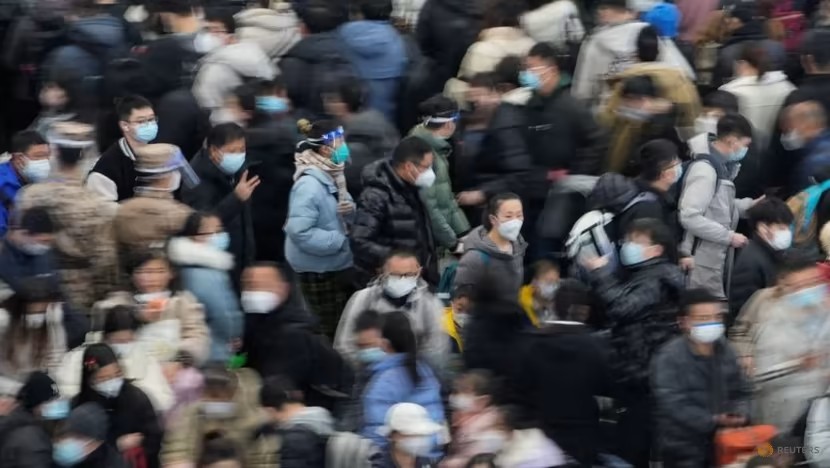China says COVID-19 has peaked as holiday rush gets into full swing
21 January, 2023

China said the worst was over in its battle against COVID-19 ahead of what is expected to be one of the busiest days of travel in years on Friday (Jan 20), a mass movement of people that has fed fears of a further surge in infections.
Vice Premier Sun Chunlan, who oversees China's virus response, said the outbreak was at a "relatively low" level, state media reported late on Thursday, after health officials said the number of COVID-19 patients in clinics, emergency rooms and with critical conditions had peaked.
But there are widespread doubts about China's account of an outbreak that has overwhelmed hospitals and crematoriums since Beijing abandoned strict COVID-19 controls and mass testing last month.
That policy U-turn, which followed historic protests against the government's "zero-COVID" regime, unleashed the virus on 1.4 billion people who had been largely shielded since it emerged in the city of Wuhan at the end of 2019. Some health experts expect that more than one million people will die of the disease in China this year, with British-based health data firm Airfinity forecasting COVID-19 fatalities could hit 36,000 a day next week.
"Recently, the overall pandemic in the country is at a relatively low level," Sun said in comments reported by the state-run Xinhua news agency.
"The number of critical patients at hospitals is decreasing steadily, though the rescue mission is still heavy."
Her comments came on the eve of what is expected to be one of the busiest days of travel across China since the pandemic erupted in late 2019, as millions of city-dwellers travel to home towns for the Chinese New Year holiday that officially begins on Saturday.
A total of 2.1 billion trips are expected to take place across China between Jan 7 and Feb 15, the transport ministry has estimated.
Passengers laden with luggage and boxes of gifts packed on to trains on Friday, heading for long-awaited family reunions.
"Everyone is eager to go home. After all, we haven't seen our families for so long," a 30-year-old surnamed Li told Reuters at Beijing's west railway station.
China's internet regulator said this week it would censor any "fake information" about the spread of the virus that could cause "gloomy" sentiment during Lunar New Year festivities.
PENT-UP DEMAND
President Xi Jinping said this week that he was concerned about an influx of travellers to rural areas with weak medical systems, and that protecting the elderly - many of whom are not fully vaccinated - was a top priority.
China reported a large jump in COVID-19 hospitalisations in the week through to Jan 15, to the highest since the pandemic began, according to a report published by the World Health Organization on Thursday.
Hospitalisations rose by 70 per cent on the previous week to 63,307, according to the WHO, citing data submitted by Beijing.
But in a news conference on Thursday, health officials said the number of COVID-19 patients reporting to hospital had peaked with more than 40 per cent fewer people being treated with critical conditions on Jan 17 compared with a peak on Jan 5.
China said last Saturday that about 60,000 people with COVID-19 had died in hospital between Dec 8 and Jan 12 - a roughly 10-fold increase from previous disclosures.
However, that toll excludes those who died at home, and some doctors have said they are discouraged from putting COVID-19 on death certificates.
While China's reopening is proving deadly, investors are hopeful that it will eventually help revive its US$17 trillion economy, placing bets that have lifted Chinese stocks and its yuan currency to multi-month highs in recent sessions.
"Markets widely anticipate a surge of pent-up demand will be unleashed from the reopening of China's economy," Nomura analysts said in a note.
The analysts cautioned though that a fall in household wealth and a surge in youth unemployment, a hangover from years of lockdowns, may temper the rebound.
While international flights from China remain at a small fraction of pre-pandemic levels, Chinese tourists, a much-missed mainstay of the world's retail and travel industry, are trickling back to tourist hotspots.
Malls from Macao to Bangkok are aiming to lure them with red lantern displays, special dances to mark the Year of the Rabbit - and discounts.
Chinese spending on travel had grown to US$255 billion in 2019, before the pandemic, and accounted for 33 per cent of spending in the global luxury personal goods market, according to estimates from Bain.
Useful Links:
Source: www.channelnewsasia.com
